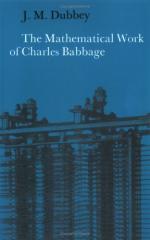|
This section contains 599 words (approx. 2 pages at 300 words per page) |

|
British Mathematician and Inventor 1791–1871
Charles Babbage was born in England in 1791. He lived during the Industrial Revolution, and his scientific, technological, and political endeavors contributed significantly to its effects.
Babbage was the son of a wealthy banker and attended Cambridge University. A brilliant man, he was elected to membership in the Royal Society before receiving his master's degree in 1817. He was appointed to the Lucasian Chair of Mathematics at Cambridge in 1828, a position also held by such great scientists as Sir Isaac Newton and today's Stephen Hawking.
As an authentic Newtonian, Babbage advocated the reduction of all things to numerical terms and believed that they could then be understood and controlled. He was particularly attracted to the use of statistics.
Babbage is often regarded as the "father of computing." In 1823, with financial support from the British government, he began work on what he called the Difference...
|
This section contains 599 words (approx. 2 pages at 300 words per page) |

|


